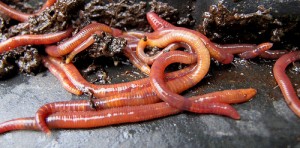Compost and worm farms, Guest Posts
Guest Post: Worm Farms for Kids

Some gardeners take their craft so seriously that they forget the beauty of allowing children to help in the garden. If you are too uptight about your garden, it can create an unpleasant experience for both you and your kids. The trick is to make gardening an enjoyable experience for everyone involved. For kids to enjoy gardening, you need to work to make it fun for them and what is more fun than getting dirty?
Aside from helping you dig holes, the best way to let your kids get dirty is to involve worms. Kids love to play with worms and worms are great for your garden so it’s a win win! You can send your kids on a worm finding expedition and have them count the worms that you dig up while gardening. If you want to take it a step further, you can start a worm farm with your kids. Worm farms are great because you can turn your table scraps and yard debris into nutrient rich compost for your garden and a nice home for worms. It is also something that can be done year round.
How to Start
You will need some sort of container, either wood or plastic, to contain your worm farm. If you plan on keeping your worm farm inside make sure it is water tight but the dimensions are really up to you. Regardless where you decide to keep your worm farm, make sure you put it away from any sort of vibration (such as the washer or dryer) because that will only make them want to hit the road. Make sure it is covered because worms need cool, moist, and dark places. Remember that worms need to stay moist to be able to breathe so don’t let them dry out or they will suffocate. If you are using a clear bin, cover it with some newspaper to keep the light out.
Provide some bedding for your worms. Shredded newspaper (black and white pages only) makes a good base for the bedding when it is slightly moist. Add a few handfuls of soil, (straight from the garden) and maybe some crushed eggs shells. Make sure the bedding isn’t too wet or the worms will drown.
One you have your container and bed ready, you can add your worms, or rather let your kids add them in. Tiger worms or red worms are most often recommended because they reproduce quickly. Earthworms are not recommended because they are not able to withstand warmer temperatures and they tend to grow and reproduce rather slowly.

Feeding your worms is rather easy. You can use kitchen scraps and treat your worm farm as a compost pile. Pretty much anything that can go into a compost pile can be put into the farm. However, it is important that you don’t add too many acidic scraps such as coffee grounds and citric fruits because worms prefer more basic conditions. Worms generally eat about half of their body weight each day so use that as a guide when determining how much to feed them.
You will soon notice worm castings in the bedding. This is great news because worm castings are a great fertilizer for your garden! Once the bedding is full of casting, you can have the kids sort through them to harvest. You can either remove just the castings to put in your garden or some of the worms as well. The choice is up to you. Either way it gives your children a chance to play with worms and get a little dirty while helping in the garden. A fun way to keep track of the progress of your worm farm is to chart how many worms are living there and how many castings are found when you harvest.
Harvesting
Harvesting the castings and liquid can be done in several ways. By introducing food scraps into your bin you can guide the worms to certain areas thus separating the castings and liquid from fresh bedding. Make sure to leave your desired area of harvest unfed to ensure everything stays separated. Another way to harvest castings and liquid is by adding a light source. Worms are typically photosensitive and will move away from light when possible. Be careful when exposing worms to light though as too much exposure can be fatal. Lastly, for those more hands-on, dumping the bin out onto an area you don’t mind getting dirty and removing castings and liquid by hand can be a fun family activity. This isn’t recommended for the impatient as it is notably more time consuming, but if you have the time, it’s a great way to get to know your worms and get a little dirty.

